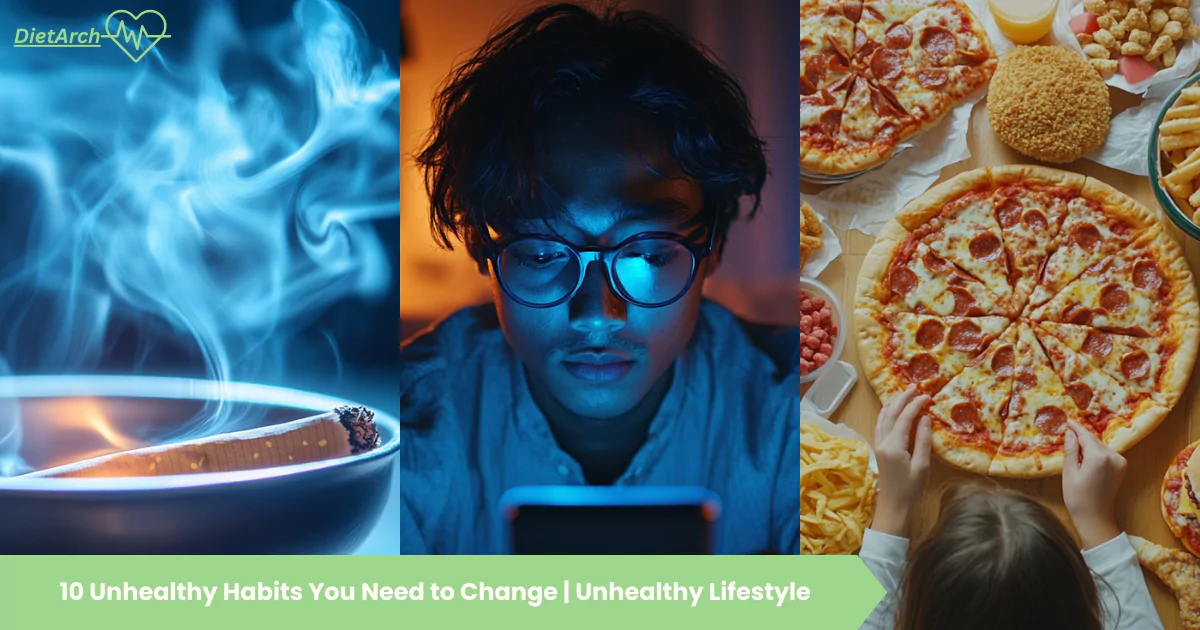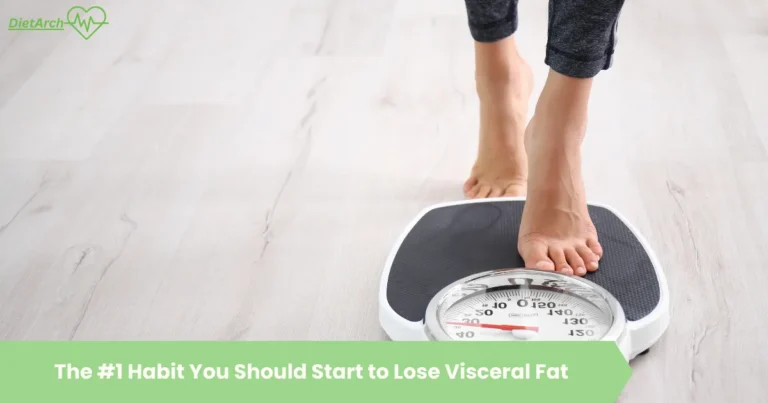10 Unhealthy Habits You Need to Change| Unhealthy Lifestyle
Many people unknowingly engage in habits that can negatively impact their health and well-being. These habits may seem minor or harmless, but over time, they can lead to serious consequences. Identifying and changing these unhealthy habits is essential for achieving a healthy lifestyle.
Breaking free from bad habits can be a challenging yet rewarding journey. By focusing on key areas that often contribute to poor health, individuals can make meaningful changes. This article outlines ten unhealthy habits that need immediate attention and offers practical suggestions for improvement.
Key Takeaways
1) Not Drinking Enough Water

Many people do not drink enough water each day. This can lead to dehydration, which affects energy levels and concentration.
Without proper hydration, individuals may experience fatigue and brain fog. Staying hydrated is crucial for maintaining both physical health and mental clarity.
Drinking enough water also supports digestion and helps the body function properly. It’s essential to make hydration a priority for better health.
2) Eating Late at Night

Eating late at night can lead to weight gain and disrupt sleep patterns. When food is consumed close to bedtime, the body may not digest it properly. This can affect metabolism and increase the risk of obesity.
Late-night eating may also change how fat is processed. People are encouraged to develop a regular healthy eating schedule. Healthy eating habits during the day can help reduce nighttime cravings.
3) Lack of Exercise

Lack of exercise is a common unhealthy habit. Many people find it hard to fit physical activity into their daily routines.
Regular exercise helps maintain a healthy weight and improves overall fitness. It can also boost mood and energy levels.
Even small changes, like taking the stairs or walking more, can make a difference. Prioritizing movement is essential to getting healthy.
4) Smoking

Smoking is a highly unhealthy habit. It damages the lungs and increases the risk of serious health issues, including heart disease and stroke.
Many people struggle to quit smoking due to its addictive nature. Setting small progressive goals can help individuals reduce their intake and move towards quitting.
Avoiding smoking not only benefits personal health but also improves the well-being of those around them. Passive smoking is equally dangerous to health. Reducing exposure to secondhand smoke can significantly lower health risks for others.
5) Sitting for Prolonged Periods

Sitting for long periods can harm health. Studies show that it increases the risk of heart disease and certain cancers. Many people who sit a lot may face issues like weak muscles and weight gain.
To reduce these risks, it’s essential to take regular breaks. Standing or walking for a few minutes can help the body stay active. Simple changes can make a difference in health and well-being.
6) Eating High Levels of Sugar

Consuming high levels of sugar can lead to various health issues. It increases the risk of obesity, diabetes, and heart disease.
Eating too much sugar can also affect energy levels and mood. It can cause spikes in blood sugar followed by crashes, making one feel tired.
Limiting added sugars in the diet is essential for better health. Choosing whole foods over processed options can help reduce sugar intake and loose visceral fat.
7) Skipping Breakfast

Skipping breakfast can lead to several health issues. Many people believe that it helps with weight loss, but research shows it may cause overeating later.
It also affects energy levels and concentration throughout the day. Eating a nutritious breakfast helps set a positive tone for healthy eating habits. Incorporating healthy foods, such as fruits or whole grains, can provide the essential nutrients needed for better performance and overall well-being.
8) Excessive Screen Time

Excessive screen time can lead to serious health issues. For children, too much time in front of screens is linked to obesity, sleep problems, and even depression.
Adults can experience the same issues, including chronic neck and back pain.
Finding a balance is essential. Setting limits on screen time can help promote healthy habits and improve overall well-being. Replacing screens with other activities can also help reduce unhealthy lifestyle habits.
9) Overconsumption of Alcohol

Overconsumption of alcohol can lead to serious health issues. It increases the risk of accidents, injuries, and long-term health problems. Many people may not realize how quickly drinking can add up.
Drinking excessively can result in nausea, hangovers, and poor decision-making. It can also damage existing health conditions and interact poorly with medications. Awareness of alcohol consumption is essential for overall health.
10) Eating Too Much Sodium

Eating too much sodium can lead to several health issues. It raises blood pressure, putting strain on the heart. High sodium intake is often linked to processed foods and restaurant meals. Many people consume more than the recommended amount daily.
Reducing sodium intake can improve an unhealthy lifestyle and condition like stroke. Drinking more water and choosing fresh foods are simple ways to reduce your intake. Making informed choices helps manage sodium levels effectively.
The Impact of Unhealthy Habits
Unhealthy habits can significantly affect both mental and physical health. Understanding these effects is crucial for preventing unhealthy lifestyle choices and improving overall well-being.

Mental and Emotional Effects
Engaging in unhealthy habits can lead to various mental and emotional issues. Poor diet, lack of sleep, and inadequate exercise are linked to higher stress and anxiety levels.
For instance, a diet high in sugars and fats may influence mood swings and feelings of sadness.
Additionally, insufficient sleep reduces the brain’s ability to function optimally. This can lead to difficulties in focusing and increased irritability. Social interactions may also suffer. Individuals may avoid activities due to low energy or a poor self-image, which can result in feelings of isolation.
Recognizing these mental health impacts can motivate individuals to adopt a healthy lifestyle and say goodbye to an unhealthy lifestyle.
Long-term Physical Health Risks
Strategies for Breaking Bad Habits

Breaking unhealthy habits involves recognizing triggers and setting achievable goals. Understanding what leads to unhealthy behaviors allows individuals to create effective strategies. Setting realistic goals helps maintain motivation and measure progress.
Understanding Triggers
Triggers are situations or feelings that prompt unhealthy habits. Identifying these triggers is crucial for making a change.
Setting Realistic Goals
Establishing attainable goals is key to breaking unhealthy habits. Unrealistic objectives often lead to frustration.
By applying these life strategies, individuals can effectively work toward breaking bad habits and fostering a healthier lifestyle.
In essence:
Changing long term unhealthy habits is not easy, but by recognizing the specific risks associated with each unhealthy habit and equipping yourself with clear guidelines of WHO and support strategies, you can take practical steps toward better health.
Whether it’s meeting daily water goals, moving more throughout the day, or moderating alcohol and sodium intake, incremental improvements add up.
Tell us your bad habits.




